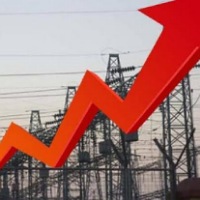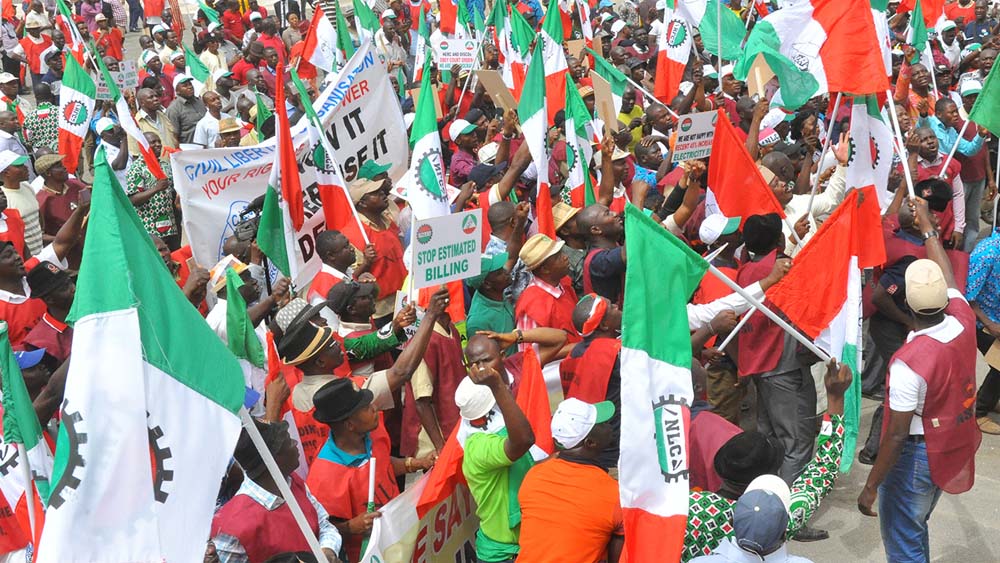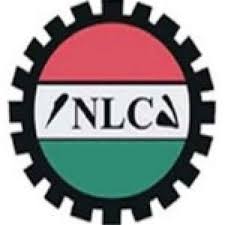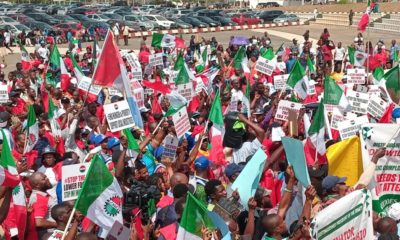Energy
NLC, TUC, CSOs Reject Electricity Tariff Hike

The Nigeria Labour Congress (NLC), Trade Union Congress (TUC), and various civil society organizations (CSOs) have jointly expressed their opposition to the proposed 40 percent increase in electricity tariff which is cheduled to come into effect on July 1.
The Nigeria Labour Congress (NLC) strongly criticized the proposed tariff increase, describing it as insensitive and callous.
Similarly, the Trade Union Congress (TUC) expressed their discontent, stating that the increase displays a complete lack of empathy towards the hardships faced by the general population.
The civil society organizations (CSOs) also voiced their opposition to the tariff hike, labeling it as unfair and lacking justification, urging the government to immediately abandon the proposal.
It is worth noting that the Nigerian Electricity Regulatory Commission (NERC) had previously justified the tariff increase by stating that the current Service Based Tariff (SBT) was based on an exchange rate of N441/$ and an inflation rate of 16.97 percent.
According to the Nigerian Electricity Regulatory Commission (NERC), the increase in electricity tariff is deemed necessary due to the current exchange rate of the naira to the dollar, which now stands above N700, and an inflation rate of 22.45 percent.
The commission argues that the tariff hike is crucial to alleviate the operational costs faced by electricity providers.
Leading the opposition against the tariff hike, the Nigeria Labour Congress (NLC) expressed concerns about the potential cumulative impact of various cost increases, such as the anticipated rise in school fees in tertiary institutions and already high fees in privately-owned educational institutions.
The NLC emphasized that with additional costs and tariffs on the horizon, life in Nigeria could become exceedingly challenging.
In a statement issued by NLC President Comrade Joe Ajaero, the union urged the government to prioritize the collective well-being of the masses and abandon the proposed tariff hike.
The statement partly reads “The plan to increase electricity tariff by 40% by July 1 is both insensitive and callous and reflects an organised indifference to the well-being of consumers, especially, the poor masses.
“The massive increase is explained away as a response to the over 100 per cent increase in the pump price of premium motor spirit, otherwise known as petrol.
“Details reveal a movement in inflation from 16.9% to 22.41 (threatening to needle 30), and a shift in exchange rate from N441 to N750. We believe not even these figures are a justification for this reckless proposed tariff increase.
“The issue of capacity to pay and quality of service delivery are not only germane but superior to any rationalisation by market logic.”
The NLC contended that there had been increases without notice in violation of statutes, saying “the service providers, in spite of sundry support, have not been able to meet the threshold of 5,000 megawatts.
“Coupled with this, there have been surreptitious increases without notice in violation of the statutes.” It added.
Energy
Savannah Energy Completes SIPEC Acquisition

In line with its announcement of 19 March 2024, Savannah Energy has completed the acquisition of Sinopec International Petroleum Exploration and Production Company Nigeria Limited (SIPEC).
Making the revelation, an elated Chief Executive Officer, Savannah Energy, Andrew Knott, said, “We are delighted to announce the completion of the SIPEC Acquisition – the achievement of one of our core business priorities for 2025. Our focus at the Stubb Creek Field will now turn to progressing the expansion project, which we expect to increase production by almost three quarters over the course of 2025/26. I look forward to updating shareholders on this in the coming months, as well as on the progress we make towards achieving the other core business priorities we outlined to shareholders earlier this month.”
He expressed gratitude to the Nigerian government for making the acquisition possible, having required several levels of regulatory approvals.
ALSO READ: Tinubu Plans 10,000 Electric Vehicles For North-East
“I would like to thank the Government of Nigeria for the support that they have shown our Company in approving the SIPEC Acquisition and I extend a warm welcome to the SIPEC employees joining Savannah today,” he added.
Biztellers reports that the SIPEC’s principal asset is the 49% non-operated interest in the Stubb Creek oil & gas field (“Stubb Creek Field”), which is operated and 51% owned by Universal Energy Resources Limited (a Savannah affiliate company).
The SIPEC Acquisition increases Savannah’s Reserves and Resources base by approximately 30% from 151 MMboe to 197 MMboe. It adds 227 Bscf of 2C gross gas Resources at Stubb Creek Field, securing significant additional long-term feedstock gas available for sale to Accugas customers.
It was gathered that the transaction consideration was fully funded through a drawdown under a US$60 million Reserve-Based Lending debt facility arranged by The Standard Bank of South Africa Limited. At completion the cumulative consideration paid was approximately US$35.1 million (inclusive of approximately US$19.5 million of cash available to SIPEC), with US$2 million in deferred cash consideration payable in eight quarterly installments post-completion.
Savannah now intends to commence an up to 18-month expansion programme, which is anticipated to increase Stubb Creek Field gross production from an average of 2.7 Kbopd in 2024 to approximately 4.7 Kbopd.
Stubb Creek Field, located in Akwa Ibom State, Nigeria, is a producing oil field with considerable undeveloped, non-associated 2C gas resources. As at year-end 2024, Stubb Creek Field had an estimated 11 MMstb of 2P gross oil Reserves and 515 Bscf of 2C gross gas Resources1.
Commercial oil production started at Stubb Creek Field in 2015, with cumulative production of 8.1 MMstb to 31 December 2024. Oil produced at Stubb Creek Field is processed through production facilities onsite and then exported to the Qua Iboe terminal via a 25 km pipeline.
The Stubb Creek Field was converted to a 20-year petroleum mining lease in accordance with the Petroleum Industry Act 2021 and effective from 1 December 2023.
Energy
Shell On Place Of Infrastructure In Developing Nigeria’s Gas resources
Shell has called for the development of infrastructure to promote the growth of domestic gas and monetisation of the resource.
At a panel session at the just concluded Nigeria International Energy Summit (NIES) in Abuja, Managing Director Shell Nigeria Gas (SNG) Ralph Gbobo, said, “The infrastructure will support the delivery of gas from producers to consumers in an efficient way that is also transparent and cost effective.”
Ralph described infrastructure as the bedrock of a thriving gas industry, citing the Escravos – Lagos Pipeline System (ELPS) which feeds the domestic gas market as an example. He said: “If we can fully implement our regulations, a key one being the Network Code and maintain a stable Network where investors can get their returns, I can guarantee that we will see more players come into this space.”
ALSO READ: Shell Exhibition Delivers Value At Energy Summit
SNG which was established in 1988 has led the way in the provision of gas infrastructure in Nigeria, building gas distribution systems in Rivers, Abia and Ogun states through which it delivers gas to over 140 domestic, industrial and commercial customers. Last year, the company signed an agreement with the Oyo State Government to build a gas distribution infrastructure with the intention of delivering gas to businesses in the state and beyond.
Ralph explained: “Our experience at SNG shows that the task of expanding the Nigerian domestic gas market is a collective responsibility and not to be done by just a few players. It requires inputs from the regulatory, upstream, midstream and downstream sectors. The key to unlocking all these inputs is driving and implementing the right polices. The implementation of clear policies and incentives, allows for more investors to come into the domestic gas market be it in terms of gas production or infrastructural development. Investors need to be assured of a stable regulatory and fiscal market where their investments are guaranteed.”
He added: “Shell Companies in Nigeria have invested across the entire value chain of gas — Upstream, Midstream and Downstream having understood the potential of the commodity to accelerate industrial and economic growth in Nigeria.”
Energy
Dangote Refunds N16bn On PMS Purchases Above Advertised Rates

The Dangote Petroleum Refinery and Petrochemicals Co is poised to absorb up N16 billion by refunding N65/litre to marketers for those who made purchases from its key partners above the advertised rates.
The move, a company statement has it, follows the refinery’s recent reduction of its gantry price from N890 to N825 per litre for Premium Motor Spirit (PMS) also known as petrol for its strategic partners – AP (Ardova Plc), Heyden, or MRS in the domestic market.
The refinery stated that this is part of its ongoing efforts to ensure that Nigerians are the primary beneficiaries of the price reduction and in line with President Bola Ahmed Tinubu’s Renewed Hope Agenda, which aims to stimulate the economy.
In a statement issued over the weekend, the refinery confirmed it will refund N65 per litre on the over 200,000 metric tonnes of PMS purchased by marketers at the old gantry price of N890 per litre, prior to the new rate of N825 per litre. Dangote refinery also absorbed N16bn loss by refunding N65/litre to marketers for Nigerians to benefit from cheaper fuel
“The step, effective February 27, 2025, guarantees that none of our valued business partners will experience a loss due to the price change. More importantly, it ensures that the new, lower rate takes immediate effect nationwide for the benefit of the Nigerian people,” the statement said.
ALSO READ: Shell Pledges Support For Reforms In Nigeria’s Oil And Gas Industry
The refinery emphasised that this initiative extends beyond MRS Holdings, Ardova Plc (AP), and Heyden. It urged other marketers sourcing stock from it to pass on the benefits of the new pricing to consumers at the retail level, encouraging a collective commitment to affordable, quality products.
Dangote also condemned any exploitation of the new pricing structure. “It is both unpatriotic and detrimental to the welfare of Nigerians for any party to purchase at a rate of N825 per litre and then sell to consumers at N945 or more per litre. This constitutes excessive profiteering, further burdening Nigerians for personal gain,” the statement added.
“Dangote Refinery in its effort to ensure good quality and affordable fuel for Nigerians, is working with its partners to make this price accessible. Consumers who purchase fuel above the advertised rate at any of its key partners – AP (Ardova Plc), Heyden, or MRS – anywhere in Nigeria, are encouraged to report to Dangote Refinery with their receipts for a full refund of the excess amount.
The approved rates per litre are as follows: MRS: N860 in Lagos, N870 in the South-West, N880 in the North, and N890 in the South-South and South-East; Heyden and AP: N865 in Lagos, N875 in the South-West, N885 in the North, and N895 in the South-South and South-East.
With the new gantry price set at N825 per litre, Dangote Refinery expects that no Nigerian will pay more than N900 per litre for PMS, regardless of location or petrol station. The refinery also underlined its commitment to providing high-quality, eco-friendly fuel that benefits vehicle performance and supports public health.
“Our commitment aligns with the objectives of President Bola Tinubu’s Renewed Hope Agenda, which champions self-sufficiency in critical sectors like energy. We remain dedicated to supporting Nigeria’s economic growth and ensuring every Nigerian has access to affordable, high-quality energy solutions,” the refinery said.
Dangote Refinery concluded, “This initiative is one of many ways Dangote Petroleum Refinery & Petrochemicals continues to contribute to a prosperous and sustainable future for our country. In this journey toward energy security, we stand united with the Nigerian people, always striving to provide lasting solutions and a more prosperous future for all.”



















